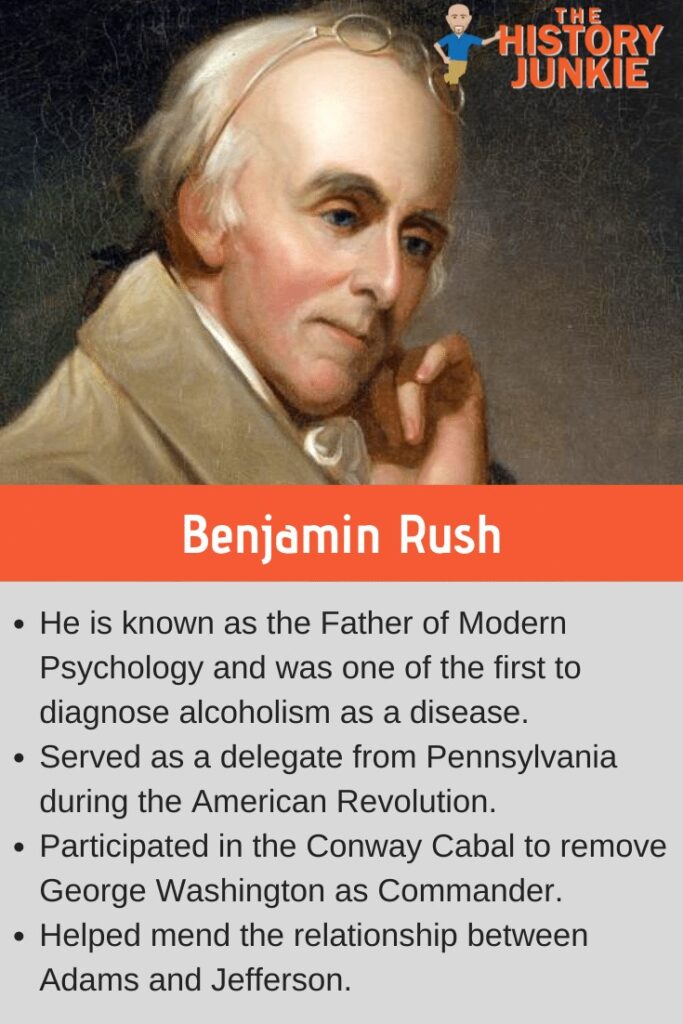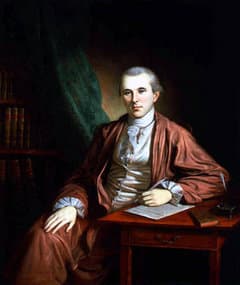Benjamin Rush (January 4, 1746 - April 19, 1813) was born in the Township of Byberry in Philadelphia County, Pennsylvania. His great-grandfather, John Rush, was an immigrant who married William Penn's sister. The Rush family was somewhat well-known in Colonial America.

His father died when he was six, and Rush was raised by his mother and her brother, Reverend Samuel Finley. This undoubtedly had a great influence on his religious views and his education.
Jump to:
He was educated by Finley's academy in Nottingham, and at the age of 15, he began a five-year degree program at Princeton University. Afterward, he would study medicine under John Redmen.
Redmen influenced Rush to continue his education at the University of Edinburgh, where he learned French, Italian, and Spanish while studying medicine.
Upon returning to the 13 original colonies in 1769, he opened a medical practice and became a professor of chemistry at the College of Pennsylvania.
Benjamin Rush Facts: Revolutionary War

Rush, along with Benjamin Franklin, was appointed as a delegate of Pennsylvania Colony to the Second Continental Congress and was a supporter of the Declaration of Independence, which he signed.
Rush also played a role in the famous pamphlet written by Thomas Paine titled Common Sense, when Paine consulted him
During the American Revolutionary War, Rush fought to remove George Washington as Commander-in-Chief during the war.
He participated in the Conway Cabal with Horatio Gates; this would cause him to lose trust with Washington and many others in Congress.
The end of his Revolutionary War service came in 1777 when he was appointed surgeon-general of the Continental Army. He had many conflicts with the Army Medical Service, which resulted in his resignation in 1778.
After the American Revolutionary War ended, he was appointed to the staff of Pennsylvania Hospital, elected to the Pennsylvania convention which adopted the Federal Constitution, was appointed a treasurer of the U.S Mint from 1797 - 1813, and became a professor of medical theory and clinical practice at the University of Pennsylvania.
He was an advocate of bloodletting and was accused of killing more of his patients than helping them.
Rush's main contribution to the medical field was his work in mental health. He wrote Medical Inquiries and Observations upon the diseases of the Mind, which was revolutionary.
He named multiple mental illnesses and attempted to classify them and list what may cure them. He also pioneered a therapeutic approach to addiction.
During a time when many believed it to be a sin to be an alcoholic, Rush believed that alcoholism was a disease and the alcoholic should be weaned off with lighter substances.
Benjamin Rush Facts: Adams and Jefferson
After the hard-fought election of 1800, Thomas Jefferson emerged as the victor, leaving a sour taste in the mouth of John Adams. Adams and Jefferson were once best friends, but their friendship appeared to have ended after the election.
Rush and Adams shared a series of letters in which Rush would eventually reunite the two patriots.
Soon, the two reunited in a letter and began would write to each other until their death on the same day.
Benjamin Rush Facts: Death
Charles Goodrich says this in his Lives of the Signers of the Declaration of Independence
The life of Dr. Rush was terminated on the 19th of April, in the 68th year of his age. During his illness, which was, of but few days continuance, his house was beset with crowds of citizens, such was the general anxiety in respect to the life of this excellent man. When, at length he died, the news of his decease spread a deep gloom over the city, and expressions of profound sympathy were received from all parts of the country.

Benjamin Rush Facts: Online Resources
- Colonial Hall Biography of Benjamin Rush
- Benjamin Rush's views on Alcoholism
- Wallbuilders - Rush, Adams, and Jefferson
- The History Junkie's Guide to Colonial America
- The History Junkie's Guide to the Signers of the Declaration of Independence
- The History Junkie's Guide to the American Revolutionary War
